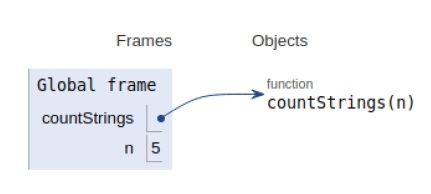
 Data Structure
Data Structure Networking
Networking RDBMS
RDBMS Operating System
Operating System Java
Java MS Excel
MS Excel iOS
iOS HTML
HTML CSS
CSS Android
Android Python
Python C Programming
C Programming C++
C++ C#
C# MongoDB
MongoDB MySQL
MySQL Javascript
Javascript PHP
PHP
- Selected Reading
- UPSC IAS Exams Notes
- Developer's Best Practices
- Questions and Answers
- Effective Resume Writing
- HR Interview Questions
- Computer Glossary
- Who is Who
Python Program to Count number of binary strings without consecutive 1’
In this article, we will learn about the solution to the problem statement given below.
Problem statement − We are given a positive integer N, we need to count all possible distinct binary strings available with length N such that no consecutive 1’s exist in the string.
Now let’s observe the solution in the implementation below −
Example
# count the number of strings
def countStrings(n):
a=[0 for i in range(n)]
b=[0 for i in range(n)]
a[0] = b[0] = 1
for i in range(1,n):
a[i] = a[i-1] + b[i-1]
b[i] = a[i-1]
return a[n-1] + b[n-1]
# main
n=5
print("The number of strings: ",countStrings(n))
Output
The number of strings: 13

All the variables are declared in the local scope and their references are seen in the figure above.
Conclusion
In this article, we have learned about how we can make a Python Program to Count number of binary strings without consecutive 1’

Advertisements